Top scientists awarded $826,000
Updated: 2014-01-11 01:13
By CHENG YINGQI (China Daily)
|
||||||||
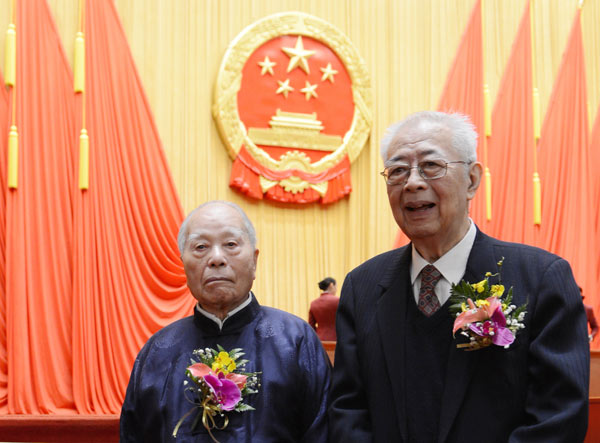 |
|
Nuclear weapons expert Cheng Kaijia (left) and physical chemist Zhang Cunhao, winners of this year’s top national science award, attend a grand ceremony in the Great Hall of the People in Beijing on Friday. ZHOU WEIHAI / FOR CHINA DAILY |
Two scientists, nuclear weapons expert Cheng Kaijia and physical chemist Zhang Cunhao, won China's top science award on Friday for their outstanding contributions to scientific and technological innovation.
The pair, both members of the Chinese Academy of Sciences, were presented with certificates by President Xi Jinping at an annual ceremony honoring distinguished scientists and research achievements.
They each won an award of 5 million yuan ($826,000).
Addressing the ceremony, Premier Li Keqiang said, "China has entered a new stage in which the country must rely more on science and technological innovation to guide and support its economic development and social progress."
The nation's traditional growth pattern, mainly driven by investment, is difficult to sustain, Li said.
Eight foreign scientists from Italy, the United States, Germany, Russia and Canada won the International Science and Technology Cooperation Award.
Meanwhile, 313 scientific research projects received the 2013 State science and technology awards.
One highlight of this year's awards was that a first-prize winner was found for the State Natural Sciences Award — which recognizes major breakthroughs in fundamental research — after a gap of three years.
The award was given to the discovery of iron-based high temperature superconductors, a project conducted by scientists from the Institute of Physics under the Chinese Academy of Sciences and other institutions.
Superconductivity basically refers to the electrical resistance of a material suddenly being reduced to zero under certain circumstances, said Zhao Zhongxian, a superconductivity physicist and member of the Chinese Academy of Sciences.
Components made from superconductors can help to improve the accuracy of atomic clocks on satellites, accelerate central processing units on computers, and increase the precision of gyroscopes on navigational devices.
"Many excellent scientists contributed to the research on superconductivity in China, and it is hard to tell whether we would have reached this point without any one of them," Zhao said. "In China, we have a good research tradition on superconductivity, and we have talent of all ages. China has become a rising power in condensed matter physics," he added.
In 2009, the research and compilation of Flora of China, a scientific publication aimed at describing plants native to China, won first prize in the State Natural Sciences Award.
The project marked collaborative efforts by Chinese scientists to publish the first modern English-language account of some 31,000 important plants and 7,500 species of trees and shrubs.
Xinhua contributed to this story
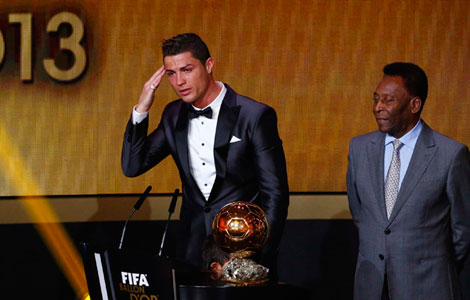
 Cristiano Ronaldo wins FIFA best player award
Cristiano Ronaldo wins FIFA best player award
 Xuelong carries on mission after breaking from floes
Xuelong carries on mission after breaking from floes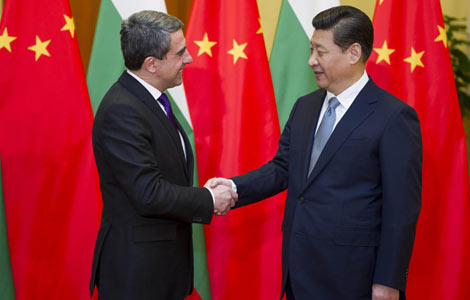
 Beijing and Sofia vow new initiatives
Beijing and Sofia vow new initiatives
 71st Golden Globe Awards
71st Golden Globe Awards
 Bangkok unrest hurts major projects and tourism industry
Bangkok unrest hurts major projects and tourism industry
 No pant for cold subway ride
No pant for cold subway ride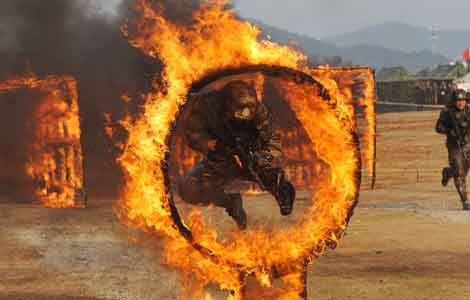
 Tough army training turns boys into men
Tough army training turns boys into men
 Blaze prompts concern for ancient buildings
Blaze prompts concern for ancient buildings
Most Viewed
Editor's Picks
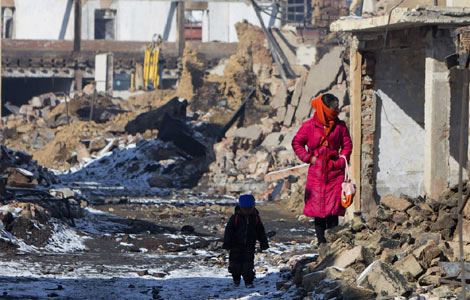
|

|

|

|
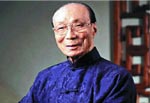
|

|
Today's Top News
Jackson's family bid for new trial denied
Newspapers must change or die
Abe’s brother to explain shrine visit to US
Protests cannot end Thai deadlock: observers
Mercy killing still a hot button issue
China builds army 'with peace in mind'
UN plea made on war victims
Li: China's tech innovation a priority
US Weekly

|

|






